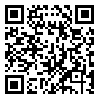Volume 23, Issue 90 (11-2023)
refahj 2023, 23(90): 211-258 |
Back to browse issues page
Download citation:
BibTeX | RIS | EndNote | Medlars | ProCite | Reference Manager | RefWorks
Send citation to:



BibTeX | RIS | EndNote | Medlars | ProCite | Reference Manager | RefWorks
Send citation to:
Aliverdinia A, Riahi M E, Madadi M, Jalili F. (2023). Sociological analysis of the type of attitude and behavior of married women with extramarital relationships toward extramarital relationships. refahj. 23(90), 211-258. doi:10.32598/refahj.23.90.1083.3
URL: http://refahj.uswr.ac.ir/article-1-4233-en.html
URL: http://refahj.uswr.ac.ir/article-1-4233-en.html
Abstract: (3209 Views)
Introduction: The purpose of this research is to investigate the type of attitude and behavior of married women who have extramarital relationships from the perspective of rational choice theory.
Method: The research method was a survey and the data collection tool was a questionnaire. The validity of the research tool was confirmed through content validity, and its reliability was confirmed through Cronbach's alpha. The research population consisted of 87 married women from Behshahr, Babol and Babolsar cities in 1400 who had extramarital relationships. The theoretical framework of the research, the rational choice theory and the independent variables of the research, were derived from this theory. The non-random sampling method was snowballing type. The type of attitude towards extramarital relationships was investigated in three cognitive, emotional and behavioral dimensions.
Findings: The results of the research showed that 35.6 percent of the respondents have an average attitude, 33.3 percent have a positive attitude, and 31 percent have a negative attitude towards extramarital relationships. Also, among the variables of the theory of rational choice, the variables of pleasure-excitement and utilitarian need had a significant relationship. The independent variables of the research were able to explain 72.6% of the changes in the dependent variable of extramarital behavior and 50.3% of the changes in the dependent variable of attitude towards extramarital relationships.
Discussion: The meaningfulness of the pleasure-excitement variable means that by increasing the motivation of pleasure and excitement, curiosity, freedom and adventure in new relationships, the positive attitude of married women towards extramarital relationships increases and the commission of extramarital behavior increases. Also, the significance of the utilitarian need variable means that if the costs of extramarital relations are less than its benefits and the costs are long-term and ineffective, the probability of committing it increases. Examining and explaining the attitude towards extramarital relationships and extramarital behavior based on the choice theory is one of the innovations of this research.
Keywords: attitude, extramarital relations, extramarital behavior, family, married women, rational choice.
Method: The research method was a survey and the data collection tool was a questionnaire. The validity of the research tool was confirmed through content validity, and its reliability was confirmed through Cronbach's alpha. The research population consisted of 87 married women from Behshahr, Babol and Babolsar cities in 1400 who had extramarital relationships. The theoretical framework of the research, the rational choice theory and the independent variables of the research, were derived from this theory. The non-random sampling method was snowballing type. The type of attitude towards extramarital relationships was investigated in three cognitive, emotional and behavioral dimensions.
Findings: The results of the research showed that 35.6 percent of the respondents have an average attitude, 33.3 percent have a positive attitude, and 31 percent have a negative attitude towards extramarital relationships. Also, among the variables of the theory of rational choice, the variables of pleasure-excitement and utilitarian need had a significant relationship. The independent variables of the research were able to explain 72.6% of the changes in the dependent variable of extramarital behavior and 50.3% of the changes in the dependent variable of attitude towards extramarital relationships.
Discussion: The meaningfulness of the pleasure-excitement variable means that by increasing the motivation of pleasure and excitement, curiosity, freedom and adventure in new relationships, the positive attitude of married women towards extramarital relationships increases and the commission of extramarital behavior increases. Also, the significance of the utilitarian need variable means that if the costs of extramarital relations are less than its benefits and the costs are long-term and ineffective, the probability of committing it increases. Examining and explaining the attitude towards extramarital relationships and extramarital behavior based on the choice theory is one of the innovations of this research.
Keywords: attitude, extramarital relations, extramarital behavior, family, married women, rational choice.
Keywords: attitude, extramarital relations, extramarital behavior, family, married women, rational choice.
Type of Study: orginal |
Received: 2023/07/18 | Accepted: 2023/11/8 | Published: 2023/11/27
Received: 2023/07/18 | Accepted: 2023/11/8 | Published: 2023/11/27
Send email to the article author
| Rights and permissions | |
 |
This work is licensed under a Creative Commons Attribution-NonCommercial 4.0 International License. |








